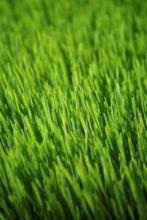HOUSTON – The number needed to treat with Timothy grass sublingual immunotherapy tablets for allergic rhinitis to achieve a clinically meaningful response is 7.9, Dr. Stephen R. Durham reported at the annual meeting of the American Academy of Allergy, Asthma, and Immunology.
What the low number needed to treat (NNT) means in this instance is that, on average, 7.9 children or adults with Timothy grass–induced allergic rhinitis with or without conjunctivitis would need to be treated with Merck’s sublingual immunotherapy tablet (SLIT) rather than placebo daily for 3 years in order for 1 additional patient to obtain sustained benefit. Sustained benefit was defined as at least 50% well days for the entire grass pollen season during each of the 3 treatment years plus the subsequent 2 years of no treatment, explained Dr. Durham of Royal Brompton and Harefield Hospitals and Imperial College, London.
A ‘well day’ was considered as a day with no use of open-label rescue medication and in which the worst score recorded was ‘none’ or ‘mild’ for each of the four nasal and two ocular symptoms measured. This NNT analysis was based upon pooled data from six pivotal randomized, double-blind, phase III, placebo-controlled clinical trials totaling 3,094 patients, Dr. Durham added.
A separate analysis of the same pooled data using a different definition of favorable response – that is, a total combined daily symptom and daily medication score of 3 or less during the entire grass pollen season during the 3 treatment years, plus the following 2 no-treatment years – yielded an NNT of 9.4. The maximum total daily symptom score during any given year was 18, while the maximum daily medication score per year was 30-36, depending upon whether the participant was a child or adult, and whether the study was conducted in Europe or the United States.
The risk-benefit ratio of SLIT for allergic rhinitis in the pooled analysis was favorable as reflected in a number needed to harm of 303, with harm defined as a treatment-related systemic allergic reaction. When the NNH was recalculated using epinephrine usage as the harmful endpoint, the NNH was closely similar at 305.
Merck’s Timothy grass SLIT, marketed as Grastek, is FDA-approved for treatment of allergic rhinitis in adults and children as young as 5 years of age.
Dr. Durham reported receiving research grants and serving as a consultant to Merck, ALK, and Stallergenes. The NNT analysis was funded by Merck, and the phase III clinical trials on which the analysis was based were supported by ALK and Merck.


